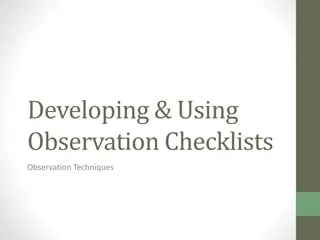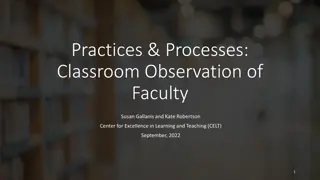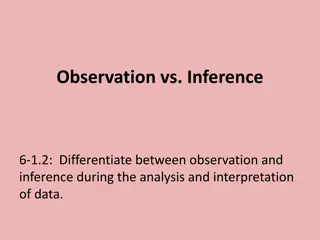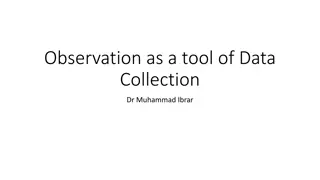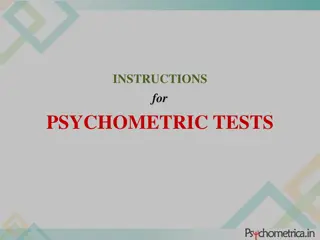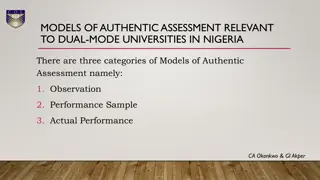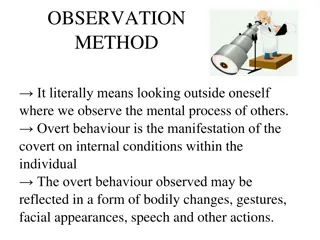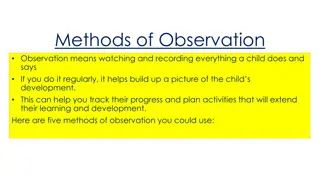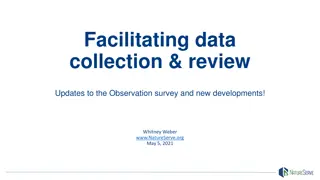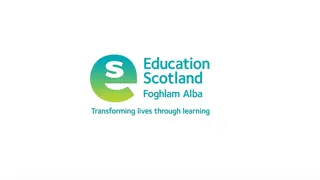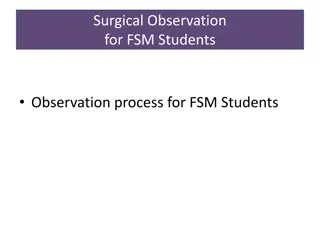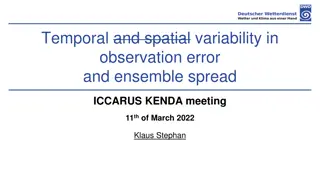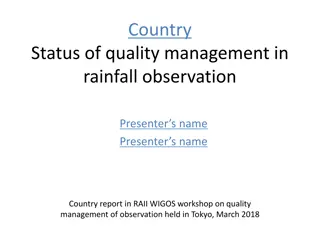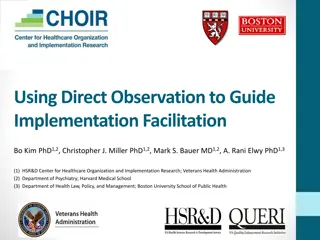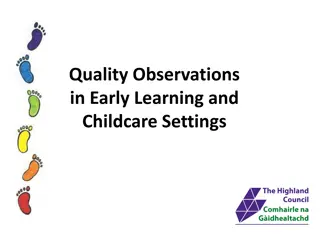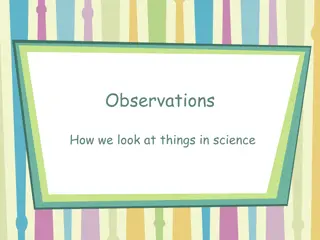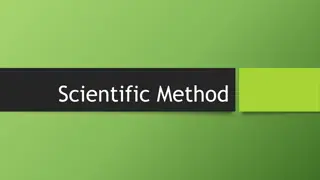Observation Practice: Reflecting on Ethical Observations of Learning
Revisit core features of successful observation practice through reflections on research and practice in this presentation. Explore the responsibilities and ethical considerations when observing and interacting with children. Dive into a case study of an Early Years Educator gathering observations of a child, prompting discussions on best practices and considerations for child's rights and well-being.
Download Presentation

Please find below an Image/Link to download the presentation.
The content on the website is provided AS IS for your information and personal use only. It may not be sold, licensed, or shared on other websites without obtaining consent from the author. Download presentation by click this link. If you encounter any issues during the download, it is possible that the publisher has removed the file from their server.
E N D
Presentation Transcript
Document title Transforming lives through learning
Ethical observations of learning Professional Learning Resource part 2 Document title Transforming lives through learning
Introduction The purpose of this presentation is to revisit the core features of successful observation practice. Throughout the presentation, reflections on research and practice will be offered. There will be opportunities offered throughout for you to pause and reflect on your own practice and to invite you to consider whether there is scope for improvement. There is no right or wring way to use this resource. It can be used by individuals and teams. It can be used from beginning to end in one session or it can be used in several sections over time. Document title Transforming lives through learning
Respectful observations Observing and interacting with young children is a pleasure and a privilege. Practitioners should be aware that being involved with children also means having responsibilities for their own actions and always being aware of the children s rights. This includes allowing the children not to be involved with activities: in brief, to act in a moral, ethical manner. Think about or discuss this quotation. Do you agree? In what ways could you be seen acting in a moral way when making observation of children? K. Brodie (2013) Observation, Assessment and Planning in the Early Years, page 22 Document title Transforming lives through learning
Being a respectful observer case study Yasmina is an Early Years Educator in a large family centre for 2-5 year olds. She is a keyworker to 20 children, most of whom are 2 and 3 years old. This week Yasmina has been told to gather more observations of a particular child, Ben, in her group. Ben is 3 year and 6 months. He loves playing and learning outdoors and recently has shown an interest in sorting the natural materials that he collects when outdoors in the wooded area. He shows little interest in mark-making and stories. Yasmina has assured her manager that she will gather all necessary observations of Ben before the end of the week. Yasmina has drawn-up a timetable of activities to do with Ben over 2 days, including story-sequencing cards, nursery rhyme games and name writing. Yasmina advises her line manager that Ben will have to miss out on his time at the Woodland while she collects her observations. Document title Transforming lives through learning
Discussion points 1. Do you think that Yasmina has taken the right approach to gather observations of Ben? What would you do differently? 2. How do you think Ben will feel about Yasmina s idea? How do you think he will respond? What impact could there be on the validity and reliability of Yasmina s observations? 3. What role has Yasmina s line manager played in this scenario? What advice and support could be offered to Yasmina to ensure that Ben s rights are better protected? Want to read more? Children and Young People s Scottish Commissioner Children and Young People s Scottish Commissioner Document title Transforming lives through learning
Ethical observation key points To what extent does Brodie s criteria match your own approach? Parent/carers understand why we observe and what we are recording. Writing an observation should never come in the way of supportive adult interaction. Written consent should be provided by parents/carers. Children have an understanding of why we make notes and take photos. Observation is about really listening to children and looking at what their play has to tell us. When observing children practitioners are mindful of the child s rights. Being aware of our own views and looking at them through the lens of equity and anti-discriminatory practice will help ensure that every child is values, included and supported. Want to read more? Kathy Brodie (2013) Observation, Assessment and Planning in the Early Years Document title Transforming lives through learning
Document title Transforming lives through learning











